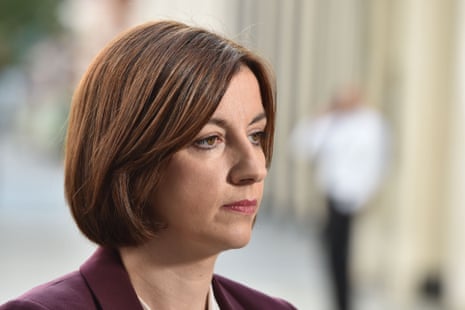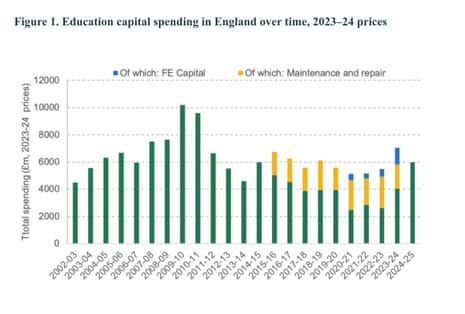Labour blames Sunak after he suggests hundreds more schools could be affected by Raac building safety crisis
In his broadcast clip this morning Rishi Sunak implied that hundreds more schools in England could be affected by dangerous concrete crisis. He said:
New information came to light relatively recently and it’s important that once it had, that the Government acted on it as swiftly as possible.
Of course I know the timing is frustrating, but I want to give people a sense of the scale of what we are grappling with here: there are around 22,000 schools in England and the important thing to know is that we expect that 95% of those schools won’t be impacted by this.
If, as Sunak implied, 5% of schools are affected, that would amount to 1,100 schools. Currently emergency procedures are in place at 104 schools. (See 10.11am.)
In response, Bridget Phillipson, the shadow education secretary, said:
The prime minister has now revealed what many parents feared: this crisis affects many more schools than they were initially led to believe.
The decisions he took directly as chancellor to drastically cut the number of schools to be rebuilt are there in black and white, in a spending review he signed off, and have put children directly at risk from this dangerous form of concrete, which should have been replaced.
It’s time that this Conservative government, including the prime minister, came clean about which schools are affected, what they knew about this dangerous concrete, and the decisions they took which have seen more than a hundred close. If they don’t, Labour will force a vote to release the information in the House of Commons.

Key events
Starmer says Keegan’s comments show how government’s handling of Raac crisis has turned to ‘farce’
And Keir Starmer has said Gillian Keegan’s statement shows what a “farce” the government’s handling of the Raac crisis has become.
Asked if he thought Keegan should resign over her comment, Starmer replied:
That’s a matter for Rishi Sunak. It’s his decision.
But, frankly, to see cabinet members coming out today, on an issue of such importance to our children and families, and simply try to blame anyone but themselves, including other members within their team, is to see farce now in this situation.
Rishi Sunak needs to act. Will he have the strength to act? I doubt it.
Lib Dems say Keegan should apologise for boasting about doing ‘good job’ over Raac
The Liberal Democrats say Gillian Keegan should apologise for saying she has done a “fucking good job” over the problem of Raac in schools. (See 2.08pm.) Munira Wilson, the Lib Dems’ education spokesperson, said:
Gillian Keegan’s disgraceful comments add insult to injury for parents who’ve seen their children’s return to school ruined by this concrete crisis.
Expecting people to thank her when children are being taught in classrooms at risk of collapse shows Keegan must be living on another planet.
The very least Keegan owes parents for her refusal to take responsibility for her shocking handling of this crisis and out of touch comments is an apology.
IFS says capital spending on schools in England ‘low in historical terms’
In his TV clip this morning Rishi Sunak dismissed suggestions that he did not fund the school repair programme properly when he was chancellor. “If you look at what we have been doing over the previous decade, that’s completely in line with what we have always done,” he said. (See 12.02pm.)
But the Institute for Fiscal Studies thinktank has published a briefing note today saying that capital spending on schools in England over the past decade has been low. Luke Sibieta, who wrote the briefing, said:
There was a large increase in spending in the late 2000s, with spending increasing from around £6bn in the mid-2000s to about £10bn in 2009-10 and 2010-11 (all in today’s prices). The large increase reflects the last Labour government’s Building Schools for the Future programme, with delays in this programme leading to the big upticks in spending in 2009-10 and 2010-11.
The Building Schools for the Future programme was largely cancelled and not replaced by the incoming government in 2010. This led to a large decline in capital spending down to about £4.6bn in 2013-14, only just above 2002-03 levels …
The lumpiness and volatility of capital spending on education make it unwise to compare individual years. However, the three-year average up to 2023-24 (focusing on schools and excluding FE) was about £5.2bn. This is about 26% lower in real terms than the three-year average of £7bn up to 2008-09 and about 50% below the peak in 2010. Indeed, the three-year average of £4.8bn up to 2022–23 was lower than any three-year period since at least 2004-05. Capital spending on schools is low in historical terms and lower in real terms than in the mid 2000s.

SNP announces reshuffle of SNP frontbench at Westminster
Stephen Flynn, the SNP leader at Westminster, has also announced a reshuffle of his team in the House of Commons. Summing up the key moves, the SNP says:
The reshuffle sees Drew Hendry MP take over as economy spokesperson and Dave Doogan MP take over as energy spokesperson. It also ensures representation from communities across Scotland, and more women promoted – with Amy Callaghan MP joining the frontbench as health spokesperson and Anum Qaisar MP taking over as levelling up spokesperson.
Tommy Sheppard MP takes over as Scotland spokesperson, while David Linden MP, Alison Thewliss MP, Alyn Smith MP and Kirsten Oswald MP are among those staying in place as social justice spokesperson, home affairs spokesperson, Europe and EU accession spokesperson, and women and equalities spokesperson, respectively.
Here is the full list.
NEW: There’s been a reshuffle at the SNP Westminster group
Owen Thompson replaces Brendan O’Hara as Chief Whip, Tommy Sheppard named Scotland spokesperson and Amy Callaghan joins the frontbench as Health spokesperson
Here’s the full frontbench team pic.twitter.com/ZqdMFzcB2n
— Alan Smith (@Political_AlanS) September 4, 2023
In the Commons Simon Hart, the government chief whip, has just moved the writ for the byelection in Mid Bedfordshire caused by the resignation of Nadine Dorries. He did not announce the date.
Before that, the three new MPs elected in byelections in July – Steve Tuckwell (Conservative – Uxbridge and South Ruislip), Keir Mather (Labour – Selby and Ainsty) and Sarah Dyke (Lib Dem – Somerton and Frome) – took their seats.
Welsh education minister says it’s ‘hugely regrettable’ DfE did not share information about Raac risk promptly

Steven Morris
The Welsh education minister, Jeremy Miles, has hit out at the UK government’s handling of the Raac school building safety crisis.
He said a Welsh government official attended a working group on Raac established by the UK government’s Cabinet Office on 24 August. No new evidence about Raac risks or its management were raised at that meeting.
Since 31 August when the UK government announced new guidance on Raac in schools, the Welsh government has “repeatedly” asked to see the evidence.
In a written ministerial statement Miles said:
Last night (Sunday) at 18.57, the UK government sent some of the evidence that we have repeatedly requested. It is hugely regrettable that the evidence that has apparently been developed over the summer has been withheld until the night before the first day back of term.
It is also incomplete, leaving us without the full rationale for the DfE’s sudden policy change towards the management of Raac in schools.
He went on:
We are undertaking further work to verify the position across Wales and a review of the latest information held by local authorities is under way. We expect to have the results of that within the next two weeks.
Upon receipt of this information we will engage with specialist structural engineers to work at pace with local authorities and further education institutions in Wales in undertaking urgent appraisal of any newly identified instances as to the presence of RAAC in education buildings. We anticipate completion of this work by the end of December.


Steven Morris
Two schools in Anglesey (Ynys Môn) in north Wales have been closed so that safety inspections can take place, the Welsh education minister, Jeremy Miles, has said.
Miles said:
The local authority is working with the headteachers of the two schools, Ysgol David Hughes and Ysgol Uwchradd Caergybi, to inform parents and carers that both schools will be temporarily closed for learners so that further safety inspections can be carried out and that alternative planning can take place.
Whilst this will be extremely difficult for parents and carers at such short notice, the health and safety of learners, teachers, staff, parents and carers remains the key priority.
They were the only two schools in Wales identified as having Raac, Miles said in a written statement.
Keegan implies her predecessors have ‘done nothing’ over Raac school buildings crisis in sweary outburst recorded on TV
Gillian Keegan, the education secretary, has been recorded complaining that she deserves credit for her handling of the Raac crisis because, unlike other politicians, she has not sat on her arse and “done nothing”.
ITV News has broadcast the clip. Keegan made the comment to the report, Dan Hewitt, after his formal interview wrapped up. She said:
Does anyone ever say, ‘You know what, you’ve done a fucking good job because everyone else has sat on their arse and done nothing.’ No, no signs of that?
Since the interview was over, Keegan will have assumed she was off the record and she may have thought she was no longer being recorded. But politicians are not normally that indiscreet when there is a camera in front of them, and perhaps she wanted her frustration to be more widely known.
In interviews this morning Keegan argued that the UK government deserved credit for at least surveying the extent of the Raac crisis. She suggested that that it was ahead of the Labour-run goverment in Wales in assessing what schools were affected.
But her self-pitying tone may go down badly with parents whose children are having their schooling affected as a result of the closures that have already taken place, or future closures that are anticipated. (See 1.35pm.)
And it is hard not to conclude that, in condemning “everyone else has sat on their arse and done nothing”, she is attacking not just the devolved administrations but her predecessors at the Department for Education too. Since 2010, there have been nine of them. It could even be taken as a dig at Rishi Sunak, who is facing criticism for not adequately addressing the problem when he was chancellor.
Labour blames Sunak after he suggests hundreds more schools could be affected by Raac building safety crisis
In his broadcast clip this morning Rishi Sunak implied that hundreds more schools in England could be affected by dangerous concrete crisis. He said:
New information came to light relatively recently and it’s important that once it had, that the Government acted on it as swiftly as possible.
Of course I know the timing is frustrating, but I want to give people a sense of the scale of what we are grappling with here: there are around 22,000 schools in England and the important thing to know is that we expect that 95% of those schools won’t be impacted by this.
If, as Sunak implied, 5% of schools are affected, that would amount to 1,100 schools. Currently emergency procedures are in place at 104 schools. (See 10.11am.)
In response, Bridget Phillipson, the shadow education secretary, said:
The prime minister has now revealed what many parents feared: this crisis affects many more schools than they were initially led to believe.
The decisions he took directly as chancellor to drastically cut the number of schools to be rebuilt are there in black and white, in a spending review he signed off, and have put children directly at risk from this dangerous form of concrete, which should have been replaced.
It’s time that this Conservative government, including the prime minister, came clean about which schools are affected, what they knew about this dangerous concrete, and the decisions they took which have seen more than a hundred close. If they don’t, Labour will force a vote to release the information in the House of Commons.

Rosena Allin-Khan says she quit as shadow mental health minister because Starmer would not make it cabinet job
Rosena Allin-Khan, who was in the previous shadow cabinet as shadow minister for mental health, says she resigned from the role because Keir Starmer would not give her an assurance that mental health would be a cabinet job in a Labour government.
In an open letter to Starmer, posted on X/Twitter, she says:
It has been a pleasure to serve as the shadow cabinet minister for mental health over the last three and a half years. As discussed previously, and in our call earlier, you made clear that you do not see a space for a mental health portfolio in a Labour cabinet, which is why I told you many weeks ago that I would not be able to continue in this role.
It’s been an honour to serve as the Shadow Cabinet Minister for Mental Health. I’ll continue to fight for a Labour Goverment, to change this country for the better. pic.twitter.com/KUuObr8kUl
— Dr Rosena Allin-Khan (@DrRosena) September 4, 2023
Labour publishes full list of new shadow cabinet as reshuffle of top team concludes
Keir Starmer has completed his shadow cabinet reshuffle. Labour has just sent out this full list of the 31-strong team.
1. Leader of the opposition: Keir Starmer
2. Deputy leader, shadow deputy prime minister and shadow secretary of state for levelling up, housing and communities: Angela Rayner
3. Shadow chancellor of the exchequer: Rachel Reeves
4. Shadow secretary of state for education: Bridget Phillipson
5. Shadow secretary of state for the home department: Yvette Cooper
6. Shadow secretary of state for health and social care: Wes Streeting
7. Shadow secretary of state for energy security and net zero: Ed Miliband
8. Shadow foreign secretary: David Lammy
9. Shadow chancellor of the Duchy of Lancaster and national campaign coordinator: Pat McFadden
10. Shadow minister without portfolio (Cabinet Office): Nick Thomas-Symonds
11. Shadow paymaster general (Cabinet Office): Jonathan Ashworth
12. Shadow secretary of state for justice: Shabana Mahmood
13. Shadow secretary of state for business and trade: Jonathan Reynolds
14. Shadow secretary of state for work and pensions: Liz Kendall
15. Shadow secretary of state for defence: John Healey
16. Shadow secretary of state for transport: Louise Haigh
17. Shadow secretary of state for culture, media and sport: Thangam Debbonaire
18. Shadow minister for women and equalities and chair of the Labour party: Anneliese Dodds
19. Shadow secretary of state for environment, food and rural affairs: Steve Reed
20. Shadow secretary of state for science, innovation and technology: Peter Kyle
21. Shadow secretary of state for Northern Ireland: Hilary Benn
22. Shadow secretary of state for Scotland: Ian Murray
23. Shadow secretary of state for Wales: Jo Stevens
24. Shadow attorney general: Emily Thornberry
25. Shadow cabinet minister for international development: Lisa Nandy
26. Shadow chief secretary to the Treasury: Darren Jones
27. Deputy national campaign coordinator: Ellie Reeves
28. Shadow leader of the House of Commons: Lucy Powell
29. Opposition chief whip in the House of Commons: Alan Campbell
30. Shadow leader of the House of Lords: Angela Smith
31. Opposition chief whip in the House of Lords: Roy Kennedy
And here are more Labour announcements.
Darren Jones has been made shadow chief secretary to the Treasury, replacing Pat McFadden. Jones was chair of the Commons business committee, which means there will now be an election for a new chair.
Nick Thomas-Symonds, who was shadow international trade secretary, has been made a shadow Cabinet Office minister. His job has been in jeopardy since Rishi Sunak merged the international trade department with the business department, meaning there has been no international trade secretary to shadow.
And Lucy Powell, who was shadow culture secretary, has been made shadow leader of the Commons.
Hilary Benn returns to shadow cabinet as shadow Northern Ireland secretary
Keir Starmer is tearing through his shadow cabinet reshuffle, and he has brought Hilary Benn back, as shadow Northern Ireland secretary. Benn, who was international development secretary and then environment secretary in the last Labour government, has not served in shadow cabinet since he was sacked by Jeremy Corbyn as shadow foreign secretary in 2016. Benn’s sacking triggered mass resignations and a challenge to Corbyn’s leadership, which he eventually saw off with ease.
Benn replaces Peter Kyle, who has been made shadow science secretary.
The only two other members of the shadow cabinet who have been full cabinet ministers are Yvette Cooper and Ed Miliband. But John Healey, the shadow defence secretary (at least, he was this morning) did have the right to attend cabinet in his last government job as housing minister.
Gillian Keegan’s statement in the Commons this afternoon on the Raac criss will not start until after 5pm. At 2.30pm there are work and pensions questions. Then, after 3.30pm, first there will be an urgent question on the Police Service of Northern Ireland data breach, and then Steve Barclay, the health secretary, will deliver a statement on the inquiry into the Lucy Letby murders at the Countess of Chester hospital.
In a thread on X, or Twitter, Preet Gill has been tweeting about losing her post as shadow international development minister. (See 11.39am.) It starts here.
It has been a great privilege to serve as the Shadow Secretary for International Development through a tumultuous few years: a global pandemic that has set the clock back on years of progress, the UK’s disastrous exit from Afghanistan, and Putin’s abhorrent war in Ukraine.
🧵 1/ It has been a great privilege to serve as the Shadow Secretary for International Development through a tumultuous few years: a global pandemic that has set the clock back on years of progress, the UK’s disastrous exit from Afghanistan, and Putin’s abhorrent war in Ukraine.
— Preet Kaur Gill MP (@PreetKGillMP) September 4, 2023
And she stresses her loyalty to Keir Starmer.
5/ It couldn’t be clearer that we need to turf out this rotten, zombie government and put a mission-driven Labour government in power. It is as clear today as it was three years ago when I supported his campaign to be leader, that Keir Starmer is the Prime Minister Britain needs.
5/ It couldn’t be clearer that we need to turf out this rotten, zombie government and put a mission-driven Labour government in power. It is as clear today as it was three years ago when I supported his campaign to be leader, that Keir Starmer is the Prime Minister Britain needs.
— Preet Kaur Gill MP (@PreetKGillMP) September 4, 2023
Labour reshuffle continues with extensive changes in lower ranks of shadow cabinet
Back to the shadow cabinet reshuffle, and the appointments are coming thick and fast. Although Keir Starmer is largely leaving his most senior shadow ministers in place (Treasury, Home Office, health, education and energy – the portfolios covered by the five Labour missions), in the lower ranks the shake-up is extensive
Shabana Mahmood, who was the national campaign coordinator, has been made shadow justice secretary, replacing Steve Reed.
Steve Reed has been made shadow environment secretary, replacing Jim McMahon. (See 10.29am.)
Pat McFadden, who was shadow chief secretary to the Treasury, becomes shadow chancellor of the duchy of Lancaster (replacing Angela Rayner in that role – see 11.06am) and national campaign coordinator (replacing Mahmood).
Liz Kendall, who was shadow social care minister, has been made shadow work and pensions secretary, replacing Jonathan Ashworth.
Ashworth becomes shadow paymaster general. This looks like a demotion, but he will stay as a full member of the shadow cabinet and Labour sources say he will play a big role in the general election campaign.
Thangam Debbonaire, who was shadow leader of the Commons, becomes shadow culture secretary. She replaces Lucy Powell.
And Peter Kyle, who was shadow Northern Ireland secretary, has been made shadow secretary of state for science, innovation and technology.
Sunak denies not properly funding school repairs as chancellor, saying his plans in line with spending over past decade
In a clip for broadcasters, Rishi Sunak has dismissed claims that he failed to properly fund school rebuilding plans when he was chancellor (see 9.07am) as “completely and utterly wrong”.
Asked to respond to Jonathan Slater, the former permanent secretary at the Department for Education, saying Sunak had halved the school repair programme, the PM replied:
I think that is completely and utterly wrong. Actually one of the first things I did as chancellor, in my first spending review in 2020, was to announce a new 10-year school re-building programme for 500 schools.
Now that equates to about 50 schools a year, that will be refurbished or rebuilt.
If you look at what we have been doing over the previous decade, that’s completely in line with what we have always done.
But Slater was not accusing Sunak of cutting school repair spending below the average annual spend for the past 10 years (a period that included austerity). Slater’s argument was that 50 school repair projects a year was half the previous year’s total, and a quarter of what the Department for Education thought was needed.
In his interview, Sunak also said that 95% of schools would not be affected by the current Raac crisis. And he said schools that did need urgent repairs would not have to fund those from their own budgets. He said:
The chancellor has been crystal clear that schools will be given extra money for these mitigations. It won’t come from their existing school budgets.
There will be extra money to the schools, so the school budget won’t be impacted by this. They will be given the extra money to deal with the mitigations …
In our expectation, 95% of schools won’t be impacted by this.











